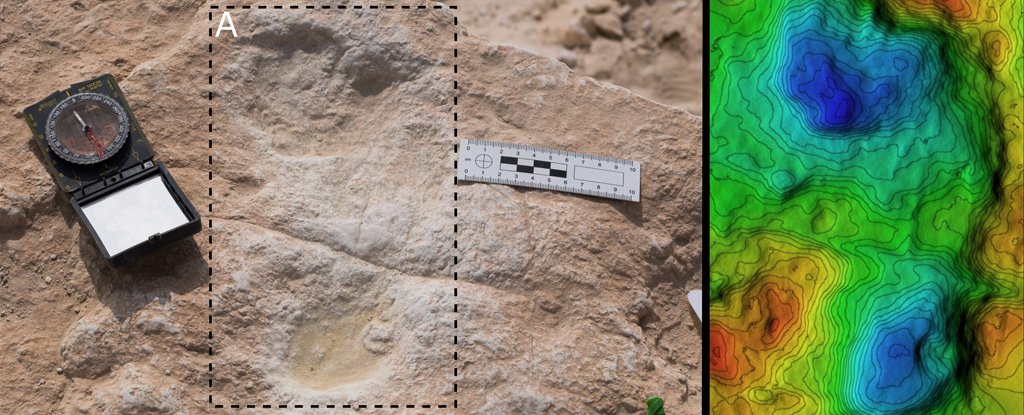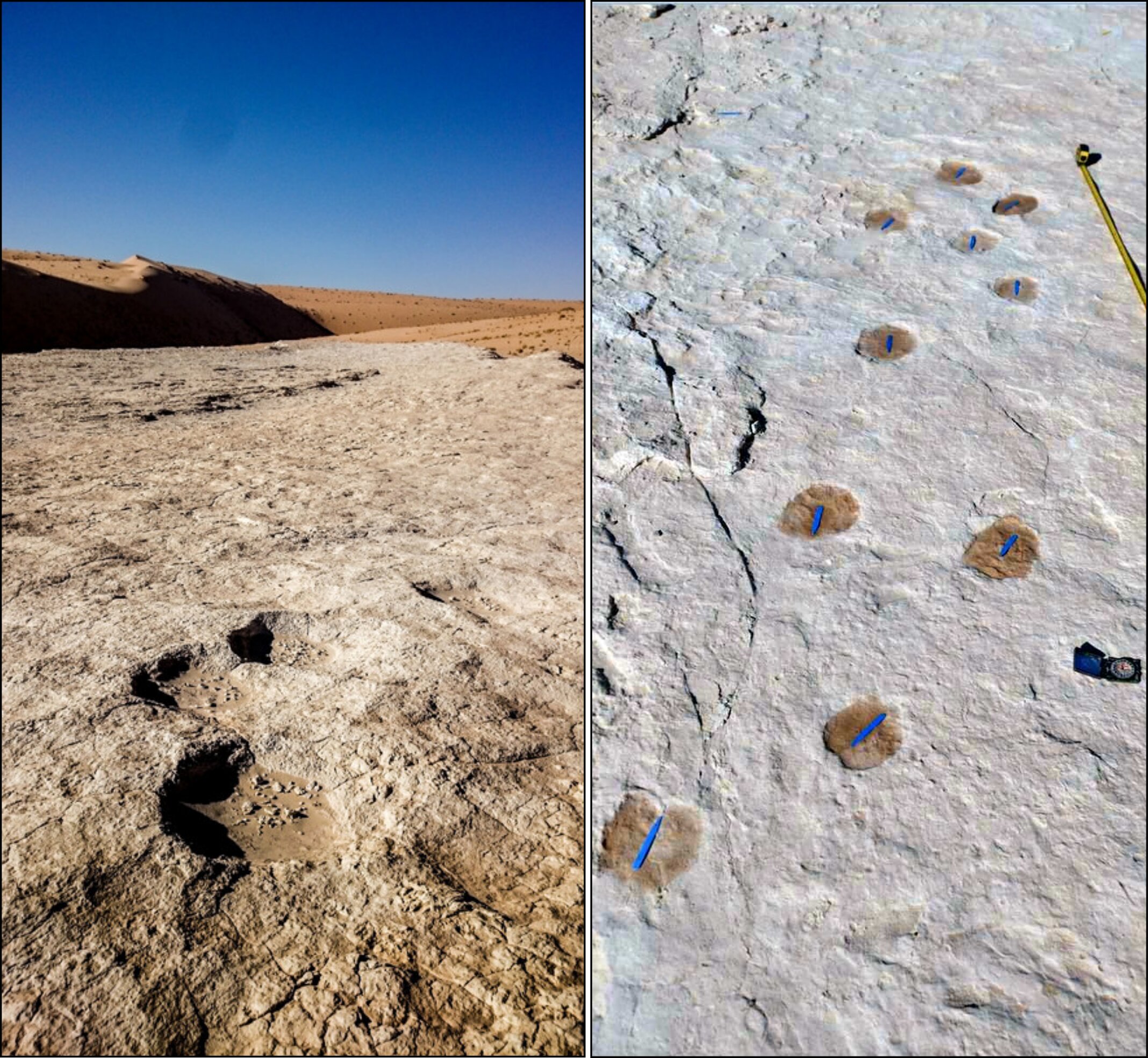
Posted on 09/18/2020 9:33:34 AM PDT by Red Badger

Around 120,000 years ago in what is now northern Saudi Arabia, a small band of Homo sapiens stopped to drink and forage at a shallow lake that was also frequented by camels, buffalo, and elephants bigger than any species seen today
The people may have hunted the large mammals but they did not stay long, using the watering hole as a waypoint on a longer journey.
This detailed scene was reconstructed by researchers in a new study published in Science Advances on Thursday, following the discovery of ancient human and animal footprints in the Nefud Desert that shed new light on the routes our ancient ancestors took as they spread out of Africa.
Today, the Arabian Peninsula is characterized by vast, arid deserts that would have been inhospitable to early people and the animals they hunted down.
But research over the last decade has shown this wasn't always the case - due to natural climate variation it experienced much greener and more humid conditions in a period known as the last interglacial.
"At certain times in the past, the deserts that dominate the interior of the peninsula transformed into expansive grasslands with permanent freshwater lakes and rivers," explained study co-author Richard Clark-Wilson of Royal Holloway.
The paper's first author Mathew Stewart, of the Max Planck Institute for Chemical Ecology, Germany, told AFP the footprints were discovered during his PhD field work in 2017 following the erosion of overlying sediments at an ancient lake dubbed 'Alathar' (meaning "the trace" in Arabic).
"Footprints are a unique form of fossil evidence in that they provide snapshots in time, typically representing a few hours or days, a resolution we tend not to get from other records," he said.
The prints were dated using a technique called optical stimulated luminescence - blasting light at quartz grains and measuring the amount of energy emitted from them.

Elephant (left) and camel trackway (right). (Stewart et al, Science Advances, 2020)
=========================================================================
A Green Arabia
In total, seven out of the hundreds of prints discovered were confidently identified as hominin, including four that, given their similar orientation, distances from one another and differences in size, were interpreted as two or three individuals travelling together.
The researchers argue these belonged to modern humans, as opposed to Neanderthals, on the basis that our extinct cousins aren't known to have been present in the wider Middle East region at the time, and based on stature and mass estimates inferred from the prints.
"We know that humans were visiting this lake at the same time these animals were, and, unusually for the area, there's no stone tools," said Stewart, which would have indicated the humans made a longer term settlement there.
"It appears that these people were visiting the lake for water resources and just to forage at the same time as the animals," and probably to also hunt them.
The elephants, which had gone extinct in the nearby Levant region some 400,000 years ago, would have been particularly attractive prey, and their presence also suggests other plentiful freshwater resources and greenery.
In addition to the footprints, some 233 fossils were recovered, and it's likely that carnivores were attracted to the herbivores at Alathar, similar to what is seen in African savannas today.
According to the paper, fossils were first recorded for Homo sapiens outside of Africa between roughly 210 and 180 thousand years in southern Greece and the Levant.
The new paper demonstrates "inland routes, following lakes and rivers, may have been particularly important to humans dispersing out of Africa" too, said Stewart.
"The presence of large animals such as elephants and hippos, together with open grasslands and large water resources, may have made northern Arabia a particularly attractive place to humans moving between Africa and Eurasia," added the study's senior author Michael Petraglia of the Max Planck Institute for the Science of Human History.
PinGGG!...........................
That is really cool.
There are human artifacts that date back 100,000 years in Israel and the Caucasus region in northeast Turkey.
When you look at a map, it is very easy to understand how the Fertile Crescent became the Cradle of Civilization for the descendants of the Out of Africa explorers.
Despite they opening blurb, hominin does not necessarily equate to homo sapiens in this case
They wuz attending the camel races.
Well, they left Africa.
That’s sounds pretty ‘sapien’ to me.....................
There are sites in California and Mexico that date from 160,000 to nearly 300,000 years ago. The whole of physical anthropology is out of wack and in turmoil like most sciences relating to the human past and origins.
I would think anywhere you find oil, fossils and ‘life’ would be plentiful.
Like the Arctic?................
Sure. Maybe explained by continental drift.
.... or Climate Change..........................
I say those are camel tracks.
Or the Antarctic...
https://www.livescience.com/60944-ancient-fossil-forest-discovered-in-antarctica.html
There is another theory that hold more credence then the out of Africa meme and is more credible since it accounts for why we have certain aquatic features which are counter-roductive for plains and aboral evolution.
There is no way that hominids came out of Africa 100k years ago, but were somehow already in South America 200K before that.
Yes, I have heard that.
We all have common ancestors that were in different parts of the Pangaea super-continent that eventually broke apart and became the modern continents..............
The issue I have with reports like this is that they state a conclusion which is read as fact by students and most readers without detailing (or even providing much of any perspective on) the layers upon layers of assumptions upon which the conclusion relies.
Thanks Red Badger. All them Sapien Homos were well ahead of Al Sharpton.
Here are the other GGG topics introduced since the previous Digest ping:
Lemuria/Mu which was much later by millions of years than Pangaea
Disclaimer: Opinions posted on Free Republic are those of the individual posters and do not necessarily represent the opinion of Free Republic or its management. All materials posted herein are protected by copyright law and the exemption for fair use of copyrighted works.